Counseling Skills for Effective Practice
VerifiedAdded on 2020/02/19
|16
|4508
|115
AI Summary
This assignment delves into the critical counseling skills required for effective practice. It emphasizes the importance of active listening, empathy, clear communication, and ethical considerations. The text highlights the role of a counselor in providing options and support to clients rather than offering direct advice. It also references various sources that provide insights into effective counseling techniques.
Contribute Materials
Your contribution can guide someone’s learning journey. Share your
documents today.

Running head: COUNSELLING SKILLS 1
Counselling skills.
Student Name
Institution
Counselling skills.
Student Name
Institution
Secure Best Marks with AI Grader
Need help grading? Try our AI Grader for instant feedback on your assignments.
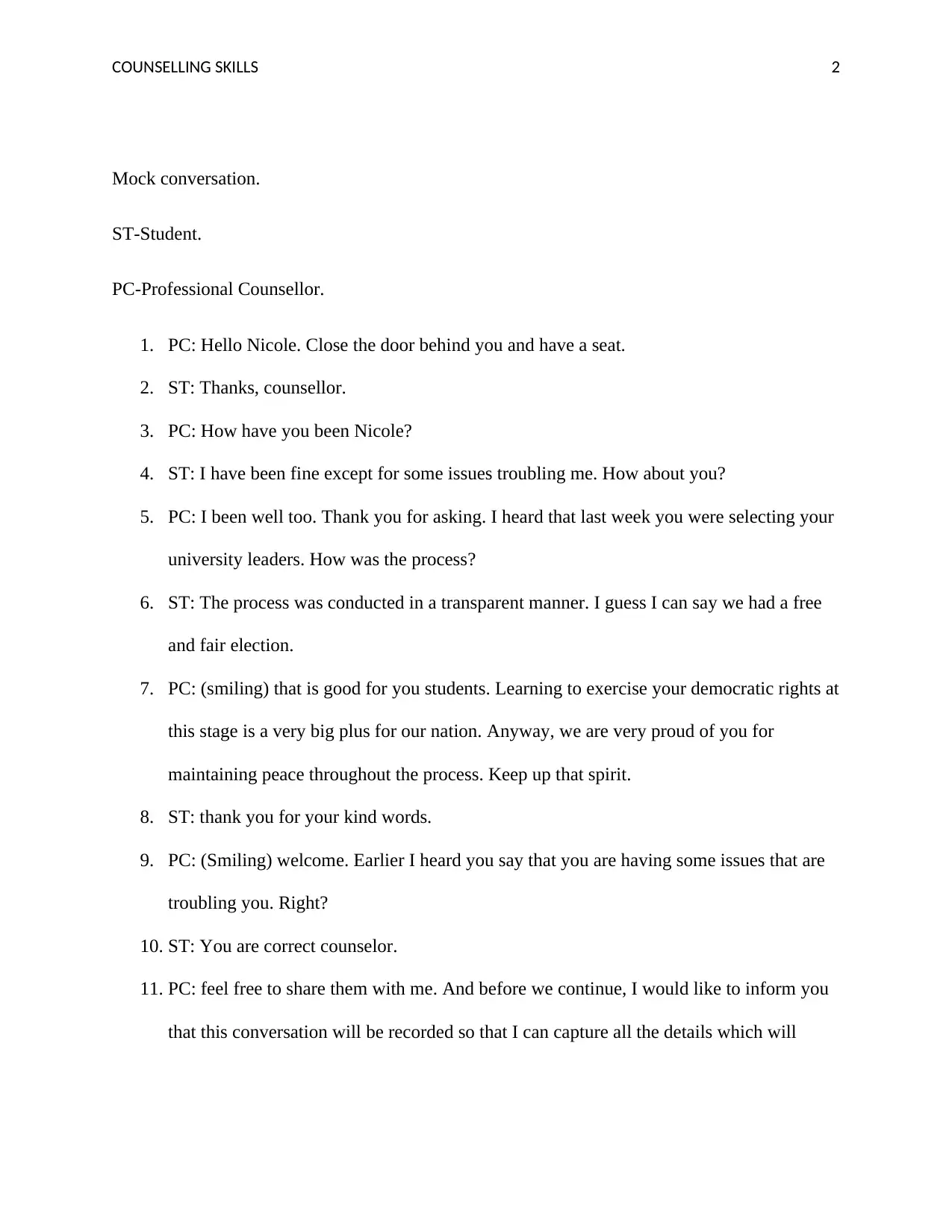
COUNSELLING SKILLS 2
Mock conversation.
ST-Student.
PC-Professional Counsellor.
1. PC: Hello Nicole. Close the door behind you and have a seat.
2. ST: Thanks, counsellor.
3. PC: How have you been Nicole?
4. ST: I have been fine except for some issues troubling me. How about you?
5. PC: I been well too. Thank you for asking. I heard that last week you were selecting your
university leaders. How was the process?
6. ST: The process was conducted in a transparent manner. I guess I can say we had a free
and fair election.
7. PC: (smiling) that is good for you students. Learning to exercise your democratic rights at
this stage is a very big plus for our nation. Anyway, we are very proud of you for
maintaining peace throughout the process. Keep up that spirit.
8. ST: thank you for your kind words.
9. PC: (Smiling) welcome. Earlier I heard you say that you are having some issues that are
troubling you. Right?
10. ST: You are correct counselor.
11. PC: feel free to share them with me. And before we continue, I would like to inform you
that this conversation will be recorded so that I can capture all the details which will
Mock conversation.
ST-Student.
PC-Professional Counsellor.
1. PC: Hello Nicole. Close the door behind you and have a seat.
2. ST: Thanks, counsellor.
3. PC: How have you been Nicole?
4. ST: I have been fine except for some issues troubling me. How about you?
5. PC: I been well too. Thank you for asking. I heard that last week you were selecting your
university leaders. How was the process?
6. ST: The process was conducted in a transparent manner. I guess I can say we had a free
and fair election.
7. PC: (smiling) that is good for you students. Learning to exercise your democratic rights at
this stage is a very big plus for our nation. Anyway, we are very proud of you for
maintaining peace throughout the process. Keep up that spirit.
8. ST: thank you for your kind words.
9. PC: (Smiling) welcome. Earlier I heard you say that you are having some issues that are
troubling you. Right?
10. ST: You are correct counselor.
11. PC: feel free to share them with me. And before we continue, I would like to inform you
that this conversation will be recorded so that I can capture all the details which will
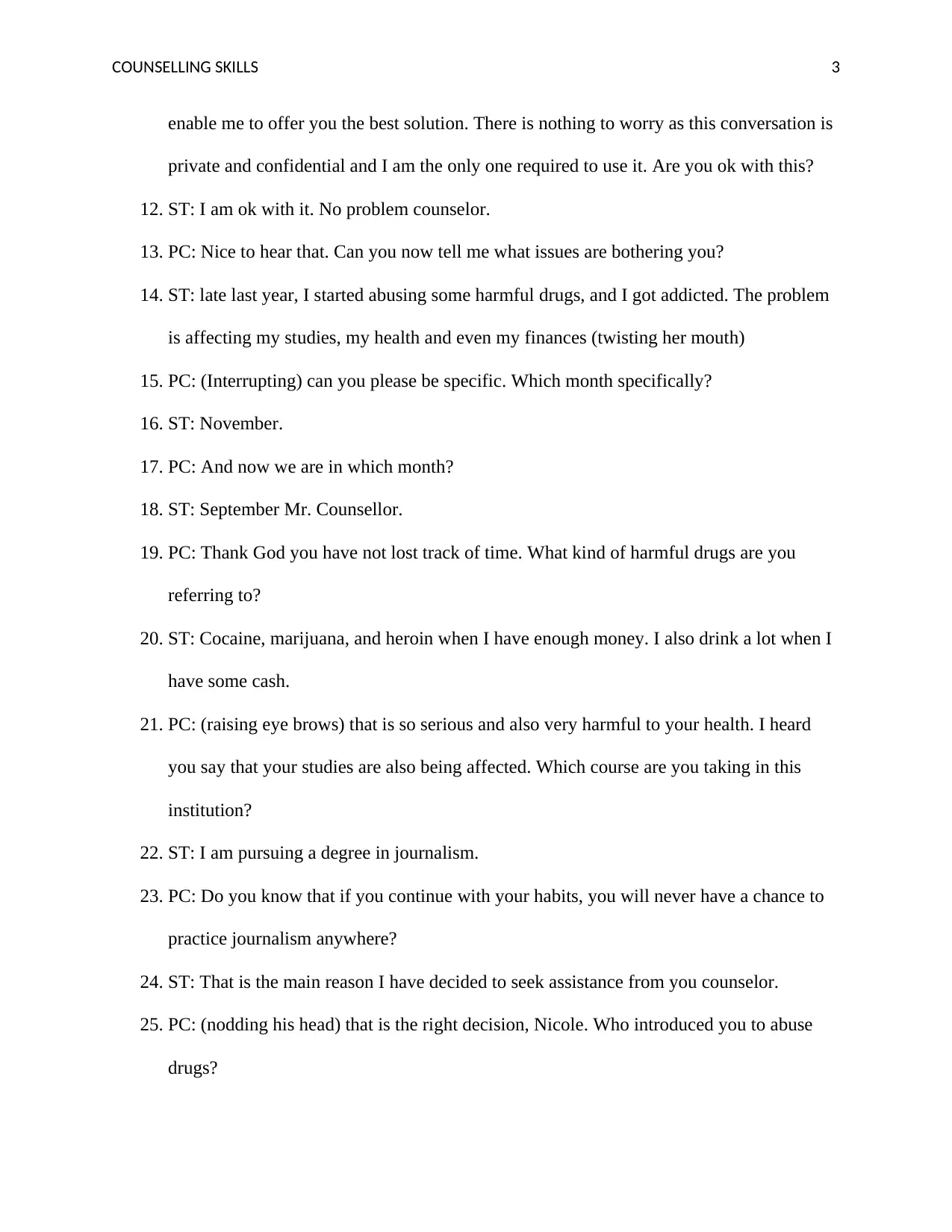
COUNSELLING SKILLS 3
enable me to offer you the best solution. There is nothing to worry as this conversation is
private and confidential and I am the only one required to use it. Are you ok with this?
12. ST: I am ok with it. No problem counselor.
13. PC: Nice to hear that. Can you now tell me what issues are bothering you?
14. ST: late last year, I started abusing some harmful drugs, and I got addicted. The problem
is affecting my studies, my health and even my finances (twisting her mouth)
15. PC: (Interrupting) can you please be specific. Which month specifically?
16. ST: November.
17. PC: And now we are in which month?
18. ST: September Mr. Counsellor.
19. PC: Thank God you have not lost track of time. What kind of harmful drugs are you
referring to?
20. ST: Cocaine, marijuana, and heroin when I have enough money. I also drink a lot when I
have some cash.
21. PC: (raising eye brows) that is so serious and also very harmful to your health. I heard
you say that your studies are also being affected. Which course are you taking in this
institution?
22. ST: I am pursuing a degree in journalism.
23. PC: Do you know that if you continue with your habits, you will never have a chance to
practice journalism anywhere?
24. ST: That is the main reason I have decided to seek assistance from you counselor.
25. PC: (nodding his head) that is the right decision, Nicole. Who introduced you to abuse
drugs?
enable me to offer you the best solution. There is nothing to worry as this conversation is
private and confidential and I am the only one required to use it. Are you ok with this?
12. ST: I am ok with it. No problem counselor.
13. PC: Nice to hear that. Can you now tell me what issues are bothering you?
14. ST: late last year, I started abusing some harmful drugs, and I got addicted. The problem
is affecting my studies, my health and even my finances (twisting her mouth)
15. PC: (Interrupting) can you please be specific. Which month specifically?
16. ST: November.
17. PC: And now we are in which month?
18. ST: September Mr. Counsellor.
19. PC: Thank God you have not lost track of time. What kind of harmful drugs are you
referring to?
20. ST: Cocaine, marijuana, and heroin when I have enough money. I also drink a lot when I
have some cash.
21. PC: (raising eye brows) that is so serious and also very harmful to your health. I heard
you say that your studies are also being affected. Which course are you taking in this
institution?
22. ST: I am pursuing a degree in journalism.
23. PC: Do you know that if you continue with your habits, you will never have a chance to
practice journalism anywhere?
24. ST: That is the main reason I have decided to seek assistance from you counselor.
25. PC: (nodding his head) that is the right decision, Nicole. Who introduced you to abuse
drugs?
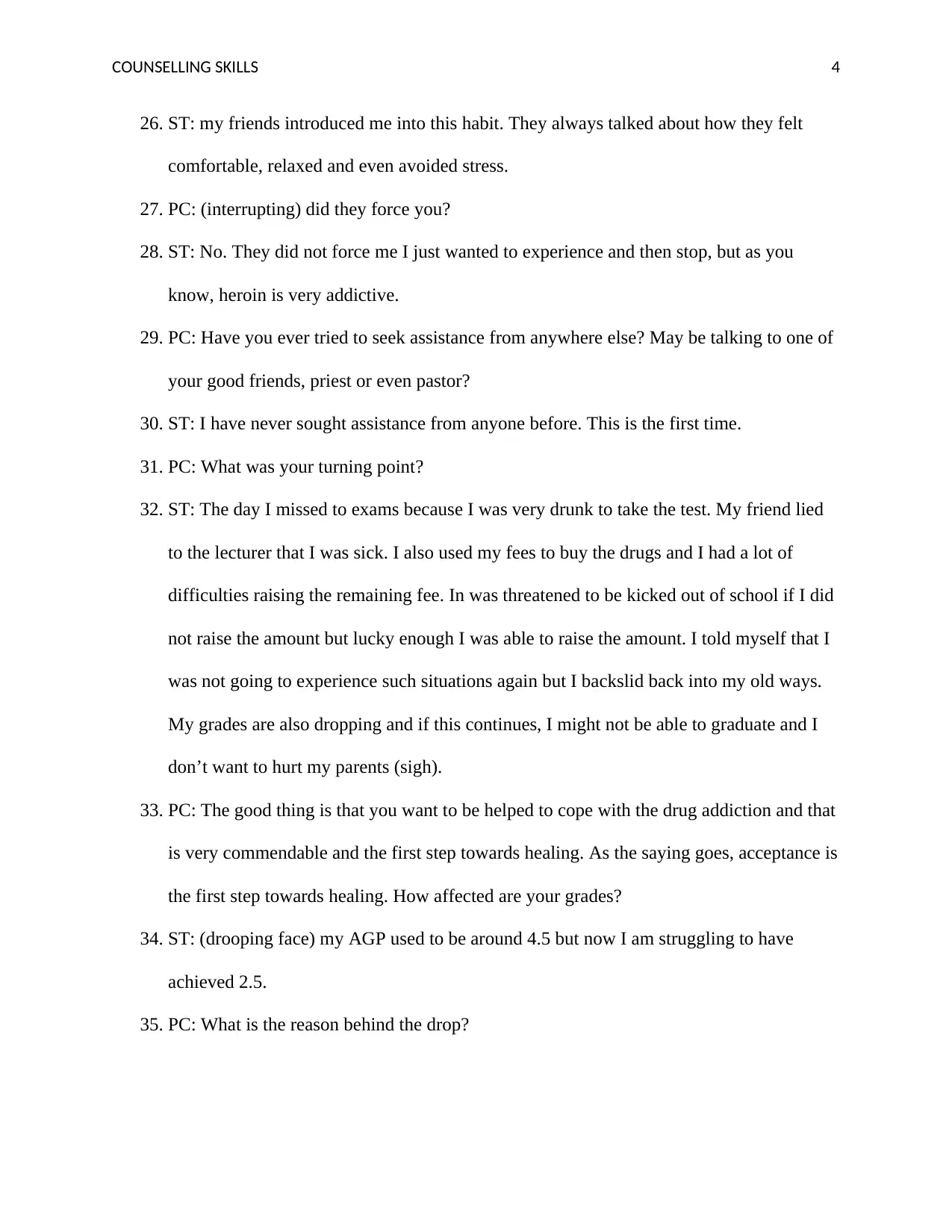
COUNSELLING SKILLS 4
26. ST: my friends introduced me into this habit. They always talked about how they felt
comfortable, relaxed and even avoided stress.
27. PC: (interrupting) did they force you?
28. ST: No. They did not force me I just wanted to experience and then stop, but as you
know, heroin is very addictive.
29. PC: Have you ever tried to seek assistance from anywhere else? May be talking to one of
your good friends, priest or even pastor?
30. ST: I have never sought assistance from anyone before. This is the first time.
31. PC: What was your turning point?
32. ST: The day I missed to exams because I was very drunk to take the test. My friend lied
to the lecturer that I was sick. I also used my fees to buy the drugs and I had a lot of
difficulties raising the remaining fee. In was threatened to be kicked out of school if I did
not raise the amount but lucky enough I was able to raise the amount. I told myself that I
was not going to experience such situations again but I backslid back into my old ways.
My grades are also dropping and if this continues, I might not be able to graduate and I
don’t want to hurt my parents (sigh).
33. PC: The good thing is that you want to be helped to cope with the drug addiction and that
is very commendable and the first step towards healing. As the saying goes, acceptance is
the first step towards healing. How affected are your grades?
34. ST: (drooping face) my AGP used to be around 4.5 but now I am struggling to have
achieved 2.5.
35. PC: What is the reason behind the drop?
26. ST: my friends introduced me into this habit. They always talked about how they felt
comfortable, relaxed and even avoided stress.
27. PC: (interrupting) did they force you?
28. ST: No. They did not force me I just wanted to experience and then stop, but as you
know, heroin is very addictive.
29. PC: Have you ever tried to seek assistance from anywhere else? May be talking to one of
your good friends, priest or even pastor?
30. ST: I have never sought assistance from anyone before. This is the first time.
31. PC: What was your turning point?
32. ST: The day I missed to exams because I was very drunk to take the test. My friend lied
to the lecturer that I was sick. I also used my fees to buy the drugs and I had a lot of
difficulties raising the remaining fee. In was threatened to be kicked out of school if I did
not raise the amount but lucky enough I was able to raise the amount. I told myself that I
was not going to experience such situations again but I backslid back into my old ways.
My grades are also dropping and if this continues, I might not be able to graduate and I
don’t want to hurt my parents (sigh).
33. PC: The good thing is that you want to be helped to cope with the drug addiction and that
is very commendable and the first step towards healing. As the saying goes, acceptance is
the first step towards healing. How affected are your grades?
34. ST: (drooping face) my AGP used to be around 4.5 but now I am struggling to have
achieved 2.5.
35. PC: What is the reason behind the drop?
Secure Best Marks with AI Grader
Need help grading? Try our AI Grader for instant feedback on your assignments.
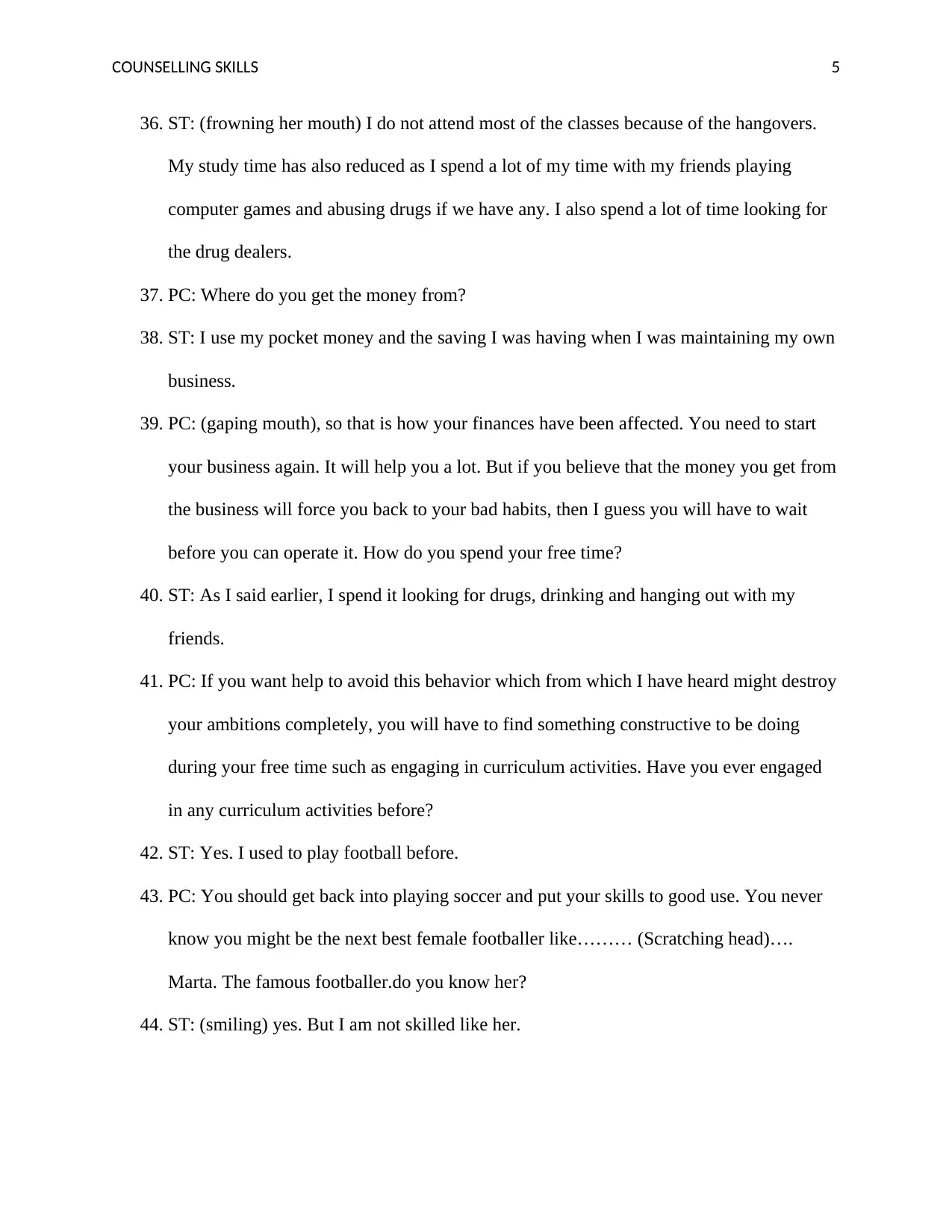
COUNSELLING SKILLS 5
36. ST: (frowning her mouth) I do not attend most of the classes because of the hangovers.
My study time has also reduced as I spend a lot of my time with my friends playing
computer games and abusing drugs if we have any. I also spend a lot of time looking for
the drug dealers.
37. PC: Where do you get the money from?
38. ST: I use my pocket money and the saving I was having when I was maintaining my own
business.
39. PC: (gaping mouth), so that is how your finances have been affected. You need to start
your business again. It will help you a lot. But if you believe that the money you get from
the business will force you back to your bad habits, then I guess you will have to wait
before you can operate it. How do you spend your free time?
40. ST: As I said earlier, I spend it looking for drugs, drinking and hanging out with my
friends.
41. PC: If you want help to avoid this behavior which from which I have heard might destroy
your ambitions completely, you will have to find something constructive to be doing
during your free time such as engaging in curriculum activities. Have you ever engaged
in any curriculum activities before?
42. ST: Yes. I used to play football before.
43. PC: You should get back into playing soccer and put your skills to good use. You never
know you might be the next best female footballer like……… (Scratching head)….
Marta. The famous footballer.do you know her?
44. ST: (smiling) yes. But I am not skilled like her.
36. ST: (frowning her mouth) I do not attend most of the classes because of the hangovers.
My study time has also reduced as I spend a lot of my time with my friends playing
computer games and abusing drugs if we have any. I also spend a lot of time looking for
the drug dealers.
37. PC: Where do you get the money from?
38. ST: I use my pocket money and the saving I was having when I was maintaining my own
business.
39. PC: (gaping mouth), so that is how your finances have been affected. You need to start
your business again. It will help you a lot. But if you believe that the money you get from
the business will force you back to your bad habits, then I guess you will have to wait
before you can operate it. How do you spend your free time?
40. ST: As I said earlier, I spend it looking for drugs, drinking and hanging out with my
friends.
41. PC: If you want help to avoid this behavior which from which I have heard might destroy
your ambitions completely, you will have to find something constructive to be doing
during your free time such as engaging in curriculum activities. Have you ever engaged
in any curriculum activities before?
42. ST: Yes. I used to play football before.
43. PC: You should get back into playing soccer and put your skills to good use. You never
know you might be the next best female footballer like……… (Scratching head)….
Marta. The famous footballer.do you know her?
44. ST: (smiling) yes. But I am not skilled like her.
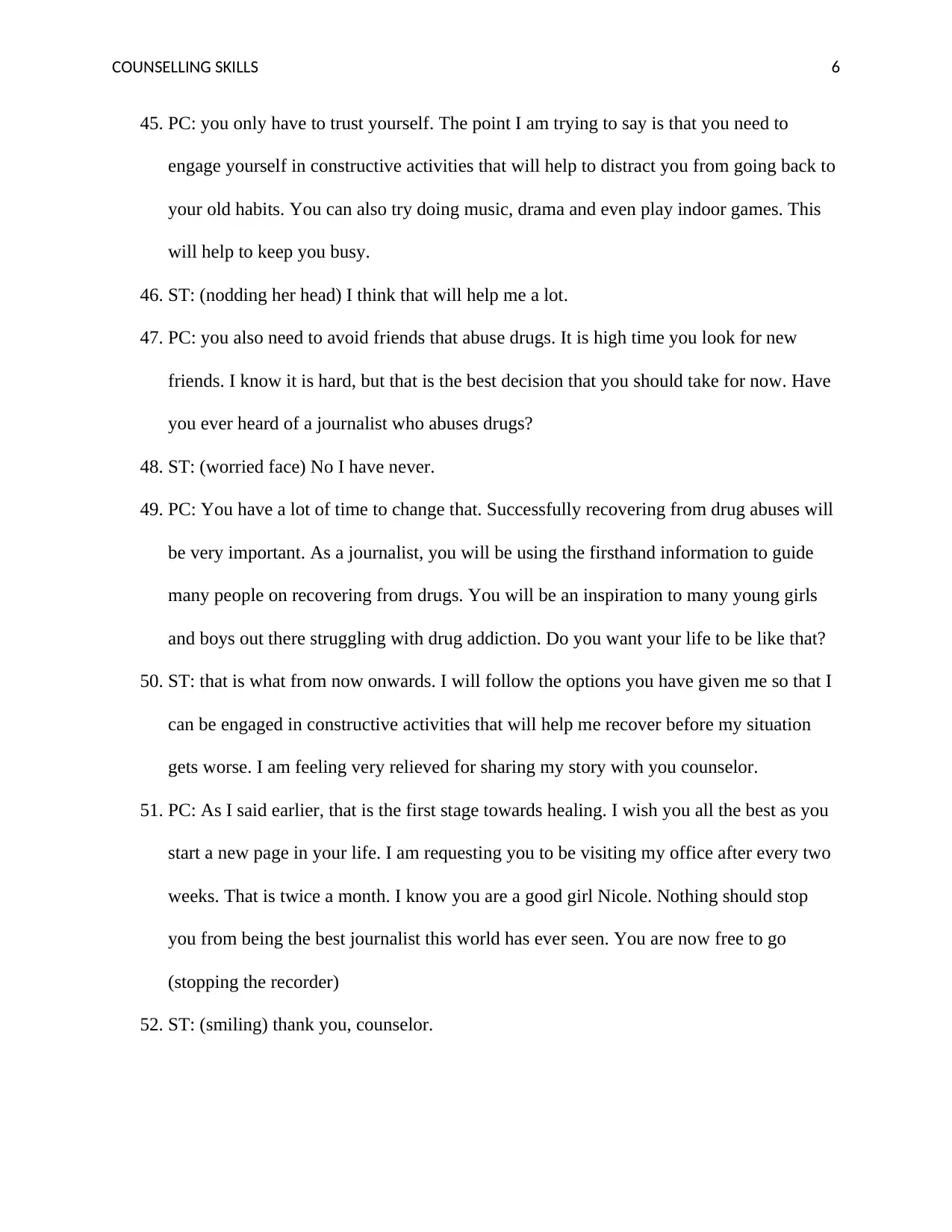
COUNSELLING SKILLS 6
45. PC: you only have to trust yourself. The point I am trying to say is that you need to
engage yourself in constructive activities that will help to distract you from going back to
your old habits. You can also try doing music, drama and even play indoor games. This
will help to keep you busy.
46. ST: (nodding her head) I think that will help me a lot.
47. PC: you also need to avoid friends that abuse drugs. It is high time you look for new
friends. I know it is hard, but that is the best decision that you should take for now. Have
you ever heard of a journalist who abuses drugs?
48. ST: (worried face) No I have never.
49. PC: You have a lot of time to change that. Successfully recovering from drug abuses will
be very important. As a journalist, you will be using the firsthand information to guide
many people on recovering from drugs. You will be an inspiration to many young girls
and boys out there struggling with drug addiction. Do you want your life to be like that?
50. ST: that is what from now onwards. I will follow the options you have given me so that I
can be engaged in constructive activities that will help me recover before my situation
gets worse. I am feeling very relieved for sharing my story with you counselor.
51. PC: As I said earlier, that is the first stage towards healing. I wish you all the best as you
start a new page in your life. I am requesting you to be visiting my office after every two
weeks. That is twice a month. I know you are a good girl Nicole. Nothing should stop
you from being the best journalist this world has ever seen. You are now free to go
(stopping the recorder)
52. ST: (smiling) thank you, counselor.
45. PC: you only have to trust yourself. The point I am trying to say is that you need to
engage yourself in constructive activities that will help to distract you from going back to
your old habits. You can also try doing music, drama and even play indoor games. This
will help to keep you busy.
46. ST: (nodding her head) I think that will help me a lot.
47. PC: you also need to avoid friends that abuse drugs. It is high time you look for new
friends. I know it is hard, but that is the best decision that you should take for now. Have
you ever heard of a journalist who abuses drugs?
48. ST: (worried face) No I have never.
49. PC: You have a lot of time to change that. Successfully recovering from drug abuses will
be very important. As a journalist, you will be using the firsthand information to guide
many people on recovering from drugs. You will be an inspiration to many young girls
and boys out there struggling with drug addiction. Do you want your life to be like that?
50. ST: that is what from now onwards. I will follow the options you have given me so that I
can be engaged in constructive activities that will help me recover before my situation
gets worse. I am feeling very relieved for sharing my story with you counselor.
51. PC: As I said earlier, that is the first stage towards healing. I wish you all the best as you
start a new page in your life. I am requesting you to be visiting my office after every two
weeks. That is twice a month. I know you are a good girl Nicole. Nothing should stop
you from being the best journalist this world has ever seen. You are now free to go
(stopping the recorder)
52. ST: (smiling) thank you, counselor.
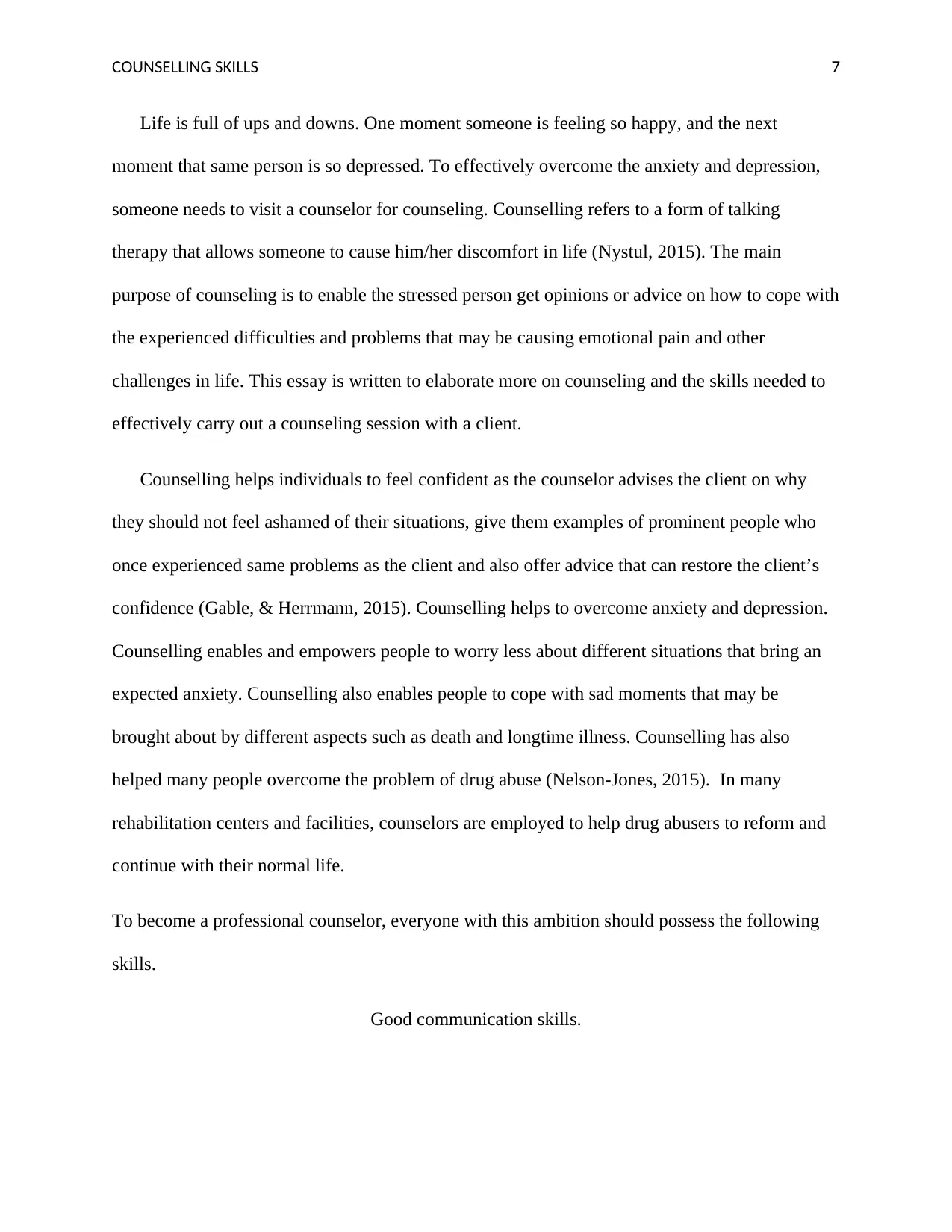
COUNSELLING SKILLS 7
Life is full of ups and downs. One moment someone is feeling so happy, and the next
moment that same person is so depressed. To effectively overcome the anxiety and depression,
someone needs to visit a counselor for counseling. Counselling refers to a form of talking
therapy that allows someone to cause him/her discomfort in life (Nystul, 2015). The main
purpose of counseling is to enable the stressed person get opinions or advice on how to cope with
the experienced difficulties and problems that may be causing emotional pain and other
challenges in life. This essay is written to elaborate more on counseling and the skills needed to
effectively carry out a counseling session with a client.
Counselling helps individuals to feel confident as the counselor advises the client on why
they should not feel ashamed of their situations, give them examples of prominent people who
once experienced same problems as the client and also offer advice that can restore the client’s
confidence (Gable, & Herrmann, 2015). Counselling helps to overcome anxiety and depression.
Counselling enables and empowers people to worry less about different situations that bring an
expected anxiety. Counselling also enables people to cope with sad moments that may be
brought about by different aspects such as death and longtime illness. Counselling has also
helped many people overcome the problem of drug abuse (Nelson-Jones, 2015). In many
rehabilitation centers and facilities, counselors are employed to help drug abusers to reform and
continue with their normal life.
To become a professional counselor, everyone with this ambition should possess the following
skills.
Good communication skills.
Life is full of ups and downs. One moment someone is feeling so happy, and the next
moment that same person is so depressed. To effectively overcome the anxiety and depression,
someone needs to visit a counselor for counseling. Counselling refers to a form of talking
therapy that allows someone to cause him/her discomfort in life (Nystul, 2015). The main
purpose of counseling is to enable the stressed person get opinions or advice on how to cope with
the experienced difficulties and problems that may be causing emotional pain and other
challenges in life. This essay is written to elaborate more on counseling and the skills needed to
effectively carry out a counseling session with a client.
Counselling helps individuals to feel confident as the counselor advises the client on why
they should not feel ashamed of their situations, give them examples of prominent people who
once experienced same problems as the client and also offer advice that can restore the client’s
confidence (Gable, & Herrmann, 2015). Counselling helps to overcome anxiety and depression.
Counselling enables and empowers people to worry less about different situations that bring an
expected anxiety. Counselling also enables people to cope with sad moments that may be
brought about by different aspects such as death and longtime illness. Counselling has also
helped many people overcome the problem of drug abuse (Nelson-Jones, 2015). In many
rehabilitation centers and facilities, counselors are employed to help drug abusers to reform and
continue with their normal life.
To become a professional counselor, everyone with this ambition should possess the following
skills.
Good communication skills.
Paraphrase This Document
Need a fresh take? Get an instant paraphrase of this document with our AI Paraphraser
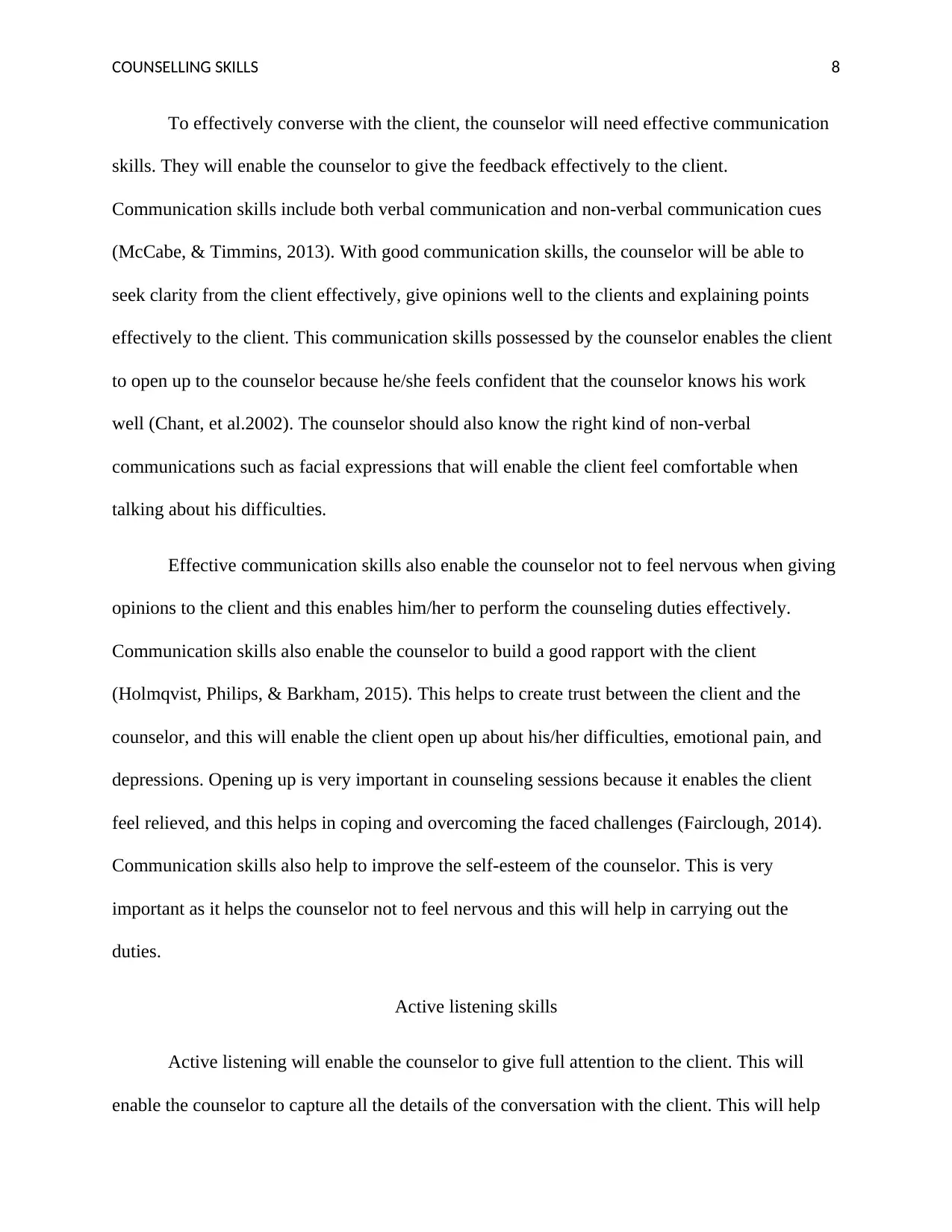
COUNSELLING SKILLS 8
To effectively converse with the client, the counselor will need effective communication
skills. They will enable the counselor to give the feedback effectively to the client.
Communication skills include both verbal communication and non-verbal communication cues
(McCabe, & Timmins, 2013). With good communication skills, the counselor will be able to
seek clarity from the client effectively, give opinions well to the clients and explaining points
effectively to the client. This communication skills possessed by the counselor enables the client
to open up to the counselor because he/she feels confident that the counselor knows his work
well (Chant, et al.2002). The counselor should also know the right kind of non-verbal
communications such as facial expressions that will enable the client feel comfortable when
talking about his difficulties.
Effective communication skills also enable the counselor not to feel nervous when giving
opinions to the client and this enables him/her to perform the counseling duties effectively.
Communication skills also enable the counselor to build a good rapport with the client
(Holmqvist, Philips, & Barkham, 2015). This helps to create trust between the client and the
counselor, and this will enable the client open up about his/her difficulties, emotional pain, and
depressions. Opening up is very important in counseling sessions because it enables the client
feel relieved, and this helps in coping and overcoming the faced challenges (Fairclough, 2014).
Communication skills also help to improve the self-esteem of the counselor. This is very
important as it helps the counselor not to feel nervous and this will help in carrying out the
duties.
Active listening skills
Active listening will enable the counselor to give full attention to the client. This will
enable the counselor to capture all the details of the conversation with the client. This will help
To effectively converse with the client, the counselor will need effective communication
skills. They will enable the counselor to give the feedback effectively to the client.
Communication skills include both verbal communication and non-verbal communication cues
(McCabe, & Timmins, 2013). With good communication skills, the counselor will be able to
seek clarity from the client effectively, give opinions well to the clients and explaining points
effectively to the client. This communication skills possessed by the counselor enables the client
to open up to the counselor because he/she feels confident that the counselor knows his work
well (Chant, et al.2002). The counselor should also know the right kind of non-verbal
communications such as facial expressions that will enable the client feel comfortable when
talking about his difficulties.
Effective communication skills also enable the counselor not to feel nervous when giving
opinions to the client and this enables him/her to perform the counseling duties effectively.
Communication skills also enable the counselor to build a good rapport with the client
(Holmqvist, Philips, & Barkham, 2015). This helps to create trust between the client and the
counselor, and this will enable the client open up about his/her difficulties, emotional pain, and
depressions. Opening up is very important in counseling sessions because it enables the client
feel relieved, and this helps in coping and overcoming the faced challenges (Fairclough, 2014).
Communication skills also help to improve the self-esteem of the counselor. This is very
important as it helps the counselor not to feel nervous and this will help in carrying out the
duties.
Active listening skills
Active listening will enable the counselor to give full attention to the client. This will
enable the counselor to capture all the details of the conversation with the client. This will help
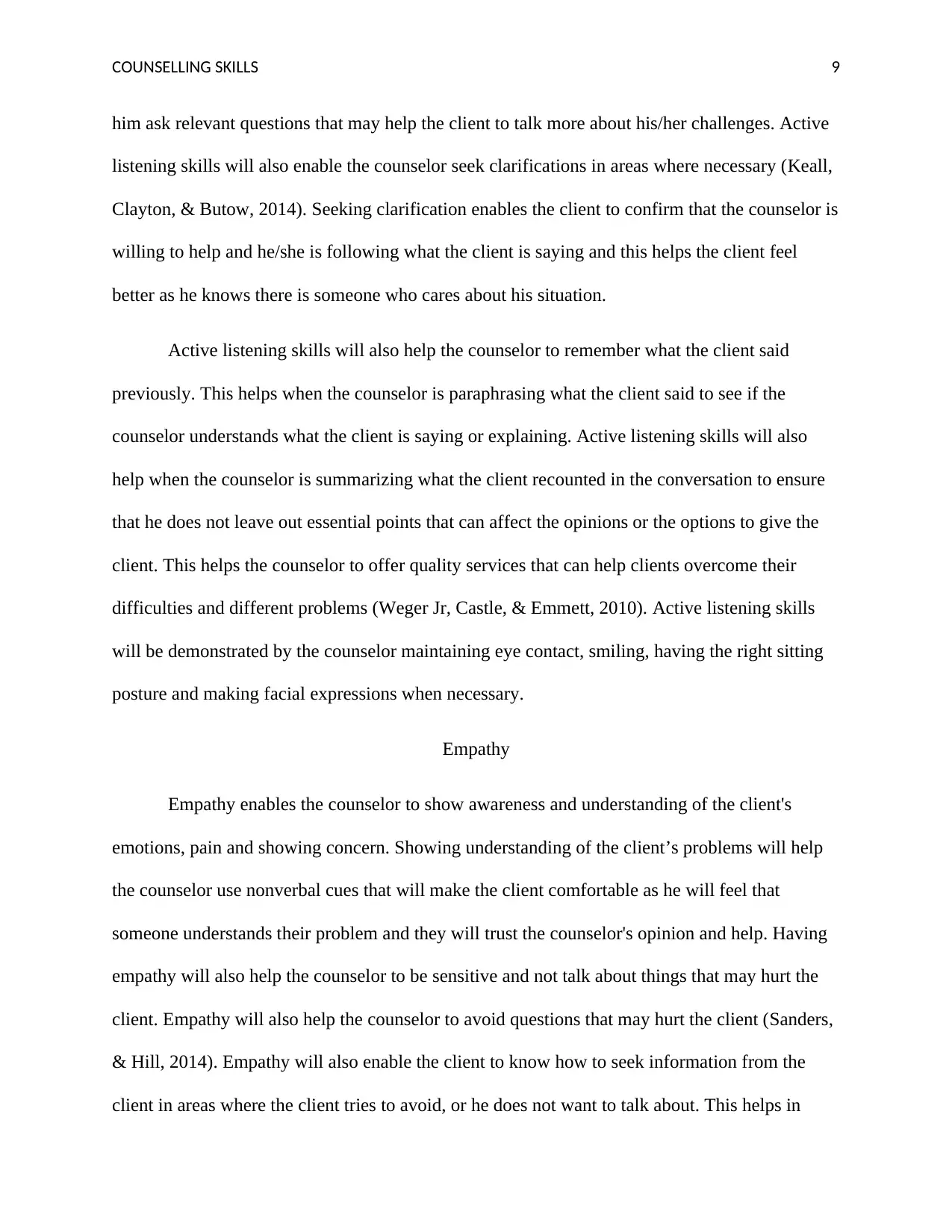
COUNSELLING SKILLS 9
him ask relevant questions that may help the client to talk more about his/her challenges. Active
listening skills will also enable the counselor seek clarifications in areas where necessary (Keall,
Clayton, & Butow, 2014). Seeking clarification enables the client to confirm that the counselor is
willing to help and he/she is following what the client is saying and this helps the client feel
better as he knows there is someone who cares about his situation.
Active listening skills will also help the counselor to remember what the client said
previously. This helps when the counselor is paraphrasing what the client said to see if the
counselor understands what the client is saying or explaining. Active listening skills will also
help when the counselor is summarizing what the client recounted in the conversation to ensure
that he does not leave out essential points that can affect the opinions or the options to give the
client. This helps the counselor to offer quality services that can help clients overcome their
difficulties and different problems (Weger Jr, Castle, & Emmett, 2010). Active listening skills
will be demonstrated by the counselor maintaining eye contact, smiling, having the right sitting
posture and making facial expressions when necessary.
Empathy
Empathy enables the counselor to show awareness and understanding of the client's
emotions, pain and showing concern. Showing understanding of the client’s problems will help
the counselor use nonverbal cues that will make the client comfortable as he will feel that
someone understands their problem and they will trust the counselor's opinion and help. Having
empathy will also help the counselor to be sensitive and not talk about things that may hurt the
client. Empathy will also help the counselor to avoid questions that may hurt the client (Sanders,
& Hill, 2014). Empathy will also enable the client to know how to seek information from the
client in areas where the client tries to avoid, or he does not want to talk about. This helps in
him ask relevant questions that may help the client to talk more about his/her challenges. Active
listening skills will also enable the counselor seek clarifications in areas where necessary (Keall,
Clayton, & Butow, 2014). Seeking clarification enables the client to confirm that the counselor is
willing to help and he/she is following what the client is saying and this helps the client feel
better as he knows there is someone who cares about his situation.
Active listening skills will also help the counselor to remember what the client said
previously. This helps when the counselor is paraphrasing what the client said to see if the
counselor understands what the client is saying or explaining. Active listening skills will also
help when the counselor is summarizing what the client recounted in the conversation to ensure
that he does not leave out essential points that can affect the opinions or the options to give the
client. This helps the counselor to offer quality services that can help clients overcome their
difficulties and different problems (Weger Jr, Castle, & Emmett, 2010). Active listening skills
will be demonstrated by the counselor maintaining eye contact, smiling, having the right sitting
posture and making facial expressions when necessary.
Empathy
Empathy enables the counselor to show awareness and understanding of the client's
emotions, pain and showing concern. Showing understanding of the client’s problems will help
the counselor use nonverbal cues that will make the client comfortable as he will feel that
someone understands their problem and they will trust the counselor's opinion and help. Having
empathy will also help the counselor to be sensitive and not talk about things that may hurt the
client. Empathy will also help the counselor to avoid questions that may hurt the client (Sanders,
& Hill, 2014). Empathy will also enable the client to know how to seek information from the
client in areas where the client tries to avoid, or he does not want to talk about. This helps in
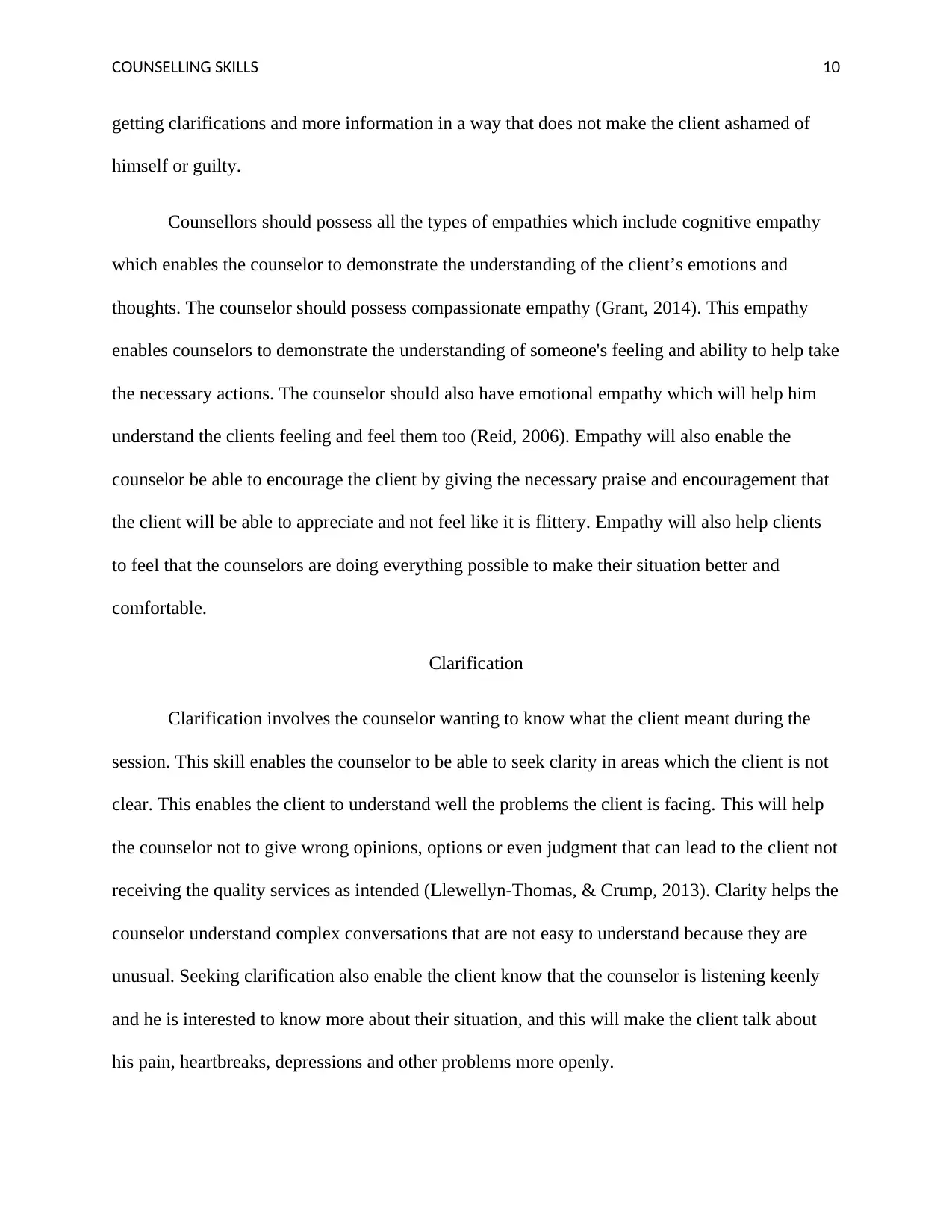
COUNSELLING SKILLS 10
getting clarifications and more information in a way that does not make the client ashamed of
himself or guilty.
Counsellors should possess all the types of empathies which include cognitive empathy
which enables the counselor to demonstrate the understanding of the client’s emotions and
thoughts. The counselor should possess compassionate empathy (Grant, 2014). This empathy
enables counselors to demonstrate the understanding of someone's feeling and ability to help take
the necessary actions. The counselor should also have emotional empathy which will help him
understand the clients feeling and feel them too (Reid, 2006). Empathy will also enable the
counselor be able to encourage the client by giving the necessary praise and encouragement that
the client will be able to appreciate and not feel like it is flittery. Empathy will also help clients
to feel that the counselors are doing everything possible to make their situation better and
comfortable.
Clarification
Clarification involves the counselor wanting to know what the client meant during the
session. This skill enables the counselor to be able to seek clarity in areas which the client is not
clear. This enables the client to understand well the problems the client is facing. This will help
the counselor not to give wrong opinions, options or even judgment that can lead to the client not
receiving the quality services as intended (Llewellyn-Thomas, & Crump, 2013). Clarity helps the
counselor understand complex conversations that are not easy to understand because they are
unusual. Seeking clarification also enable the client know that the counselor is listening keenly
and he is interested to know more about their situation, and this will make the client talk about
his pain, heartbreaks, depressions and other problems more openly.
getting clarifications and more information in a way that does not make the client ashamed of
himself or guilty.
Counsellors should possess all the types of empathies which include cognitive empathy
which enables the counselor to demonstrate the understanding of the client’s emotions and
thoughts. The counselor should possess compassionate empathy (Grant, 2014). This empathy
enables counselors to demonstrate the understanding of someone's feeling and ability to help take
the necessary actions. The counselor should also have emotional empathy which will help him
understand the clients feeling and feel them too (Reid, 2006). Empathy will also enable the
counselor be able to encourage the client by giving the necessary praise and encouragement that
the client will be able to appreciate and not feel like it is flittery. Empathy will also help clients
to feel that the counselors are doing everything possible to make their situation better and
comfortable.
Clarification
Clarification involves the counselor wanting to know what the client meant during the
session. This skill enables the counselor to be able to seek clarity in areas which the client is not
clear. This enables the client to understand well the problems the client is facing. This will help
the counselor not to give wrong opinions, options or even judgment that can lead to the client not
receiving the quality services as intended (Llewellyn-Thomas, & Crump, 2013). Clarity helps the
counselor understand complex conversations that are not easy to understand because they are
unusual. Seeking clarification also enable the client know that the counselor is listening keenly
and he is interested to know more about their situation, and this will make the client talk about
his pain, heartbreaks, depressions and other problems more openly.
Secure Best Marks with AI Grader
Need help grading? Try our AI Grader for instant feedback on your assignments.
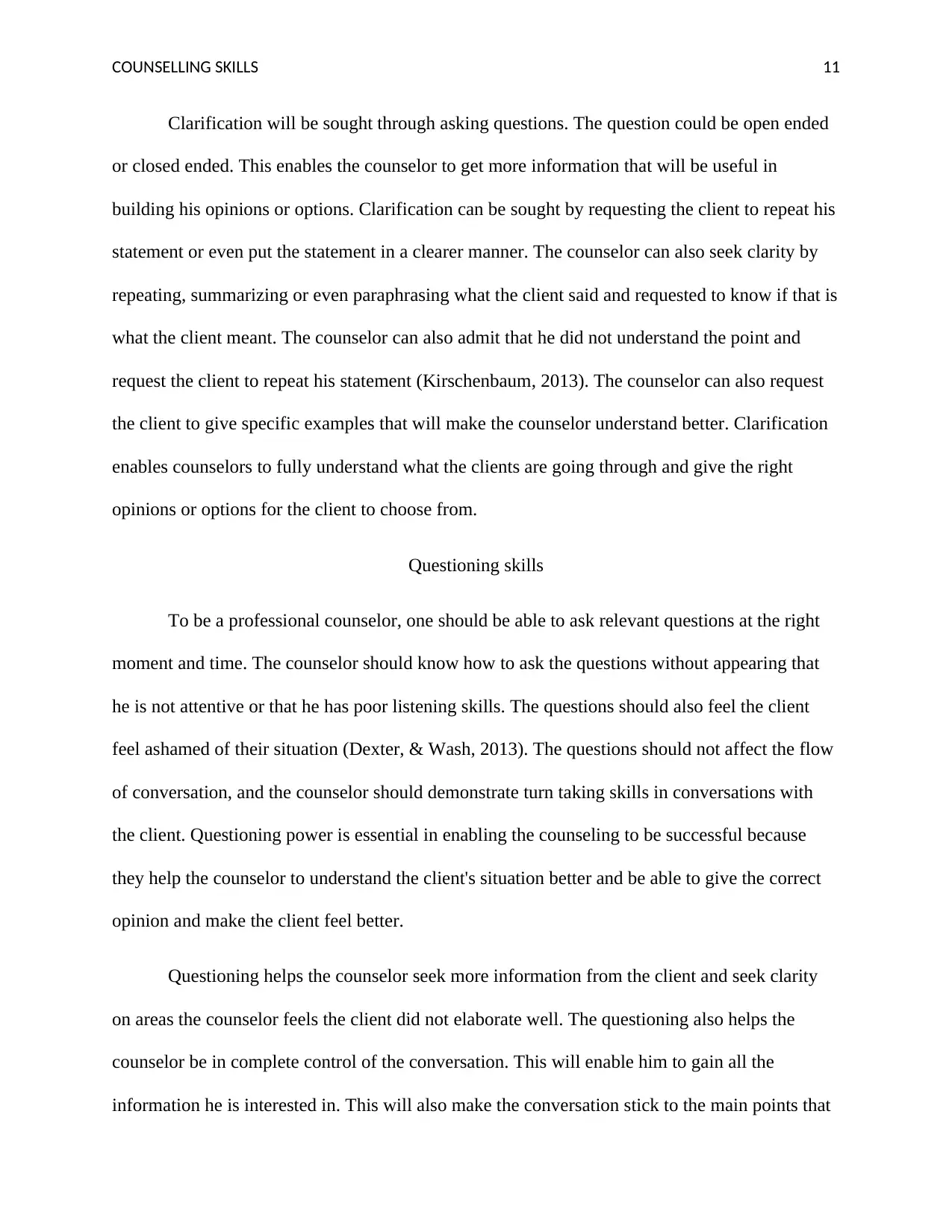
COUNSELLING SKILLS 11
Clarification will be sought through asking questions. The question could be open ended
or closed ended. This enables the counselor to get more information that will be useful in
building his opinions or options. Clarification can be sought by requesting the client to repeat his
statement or even put the statement in a clearer manner. The counselor can also seek clarity by
repeating, summarizing or even paraphrasing what the client said and requested to know if that is
what the client meant. The counselor can also admit that he did not understand the point and
request the client to repeat his statement (Kirschenbaum, 2013). The counselor can also request
the client to give specific examples that will make the counselor understand better. Clarification
enables counselors to fully understand what the clients are going through and give the right
opinions or options for the client to choose from.
Questioning skills
To be a professional counselor, one should be able to ask relevant questions at the right
moment and time. The counselor should know how to ask the questions without appearing that
he is not attentive or that he has poor listening skills. The questions should also feel the client
feel ashamed of their situation (Dexter, & Wash, 2013). The questions should not affect the flow
of conversation, and the counselor should demonstrate turn taking skills in conversations with
the client. Questioning power is essential in enabling the counseling to be successful because
they help the counselor to understand the client's situation better and be able to give the correct
opinion and make the client feel better.
Questioning helps the counselor seek more information from the client and seek clarity
on areas the counselor feels the client did not elaborate well. The questioning also helps the
counselor be in complete control of the conversation. This will enable him to gain all the
information he is interested in. This will also make the conversation stick to the main points that
Clarification will be sought through asking questions. The question could be open ended
or closed ended. This enables the counselor to get more information that will be useful in
building his opinions or options. Clarification can be sought by requesting the client to repeat his
statement or even put the statement in a clearer manner. The counselor can also seek clarity by
repeating, summarizing or even paraphrasing what the client said and requested to know if that is
what the client meant. The counselor can also admit that he did not understand the point and
request the client to repeat his statement (Kirschenbaum, 2013). The counselor can also request
the client to give specific examples that will make the counselor understand better. Clarification
enables counselors to fully understand what the clients are going through and give the right
opinions or options for the client to choose from.
Questioning skills
To be a professional counselor, one should be able to ask relevant questions at the right
moment and time. The counselor should know how to ask the questions without appearing that
he is not attentive or that he has poor listening skills. The questions should also feel the client
feel ashamed of their situation (Dexter, & Wash, 2013). The questions should not affect the flow
of conversation, and the counselor should demonstrate turn taking skills in conversations with
the client. Questioning power is essential in enabling the counseling to be successful because
they help the counselor to understand the client's situation better and be able to give the correct
opinion and make the client feel better.
Questioning helps the counselor seek more information from the client and seek clarity
on areas the counselor feels the client did not elaborate well. The questioning also helps the
counselor be in complete control of the conversation. This will enable him to gain all the
information he is interested in. This will also make the conversation stick to the main points that
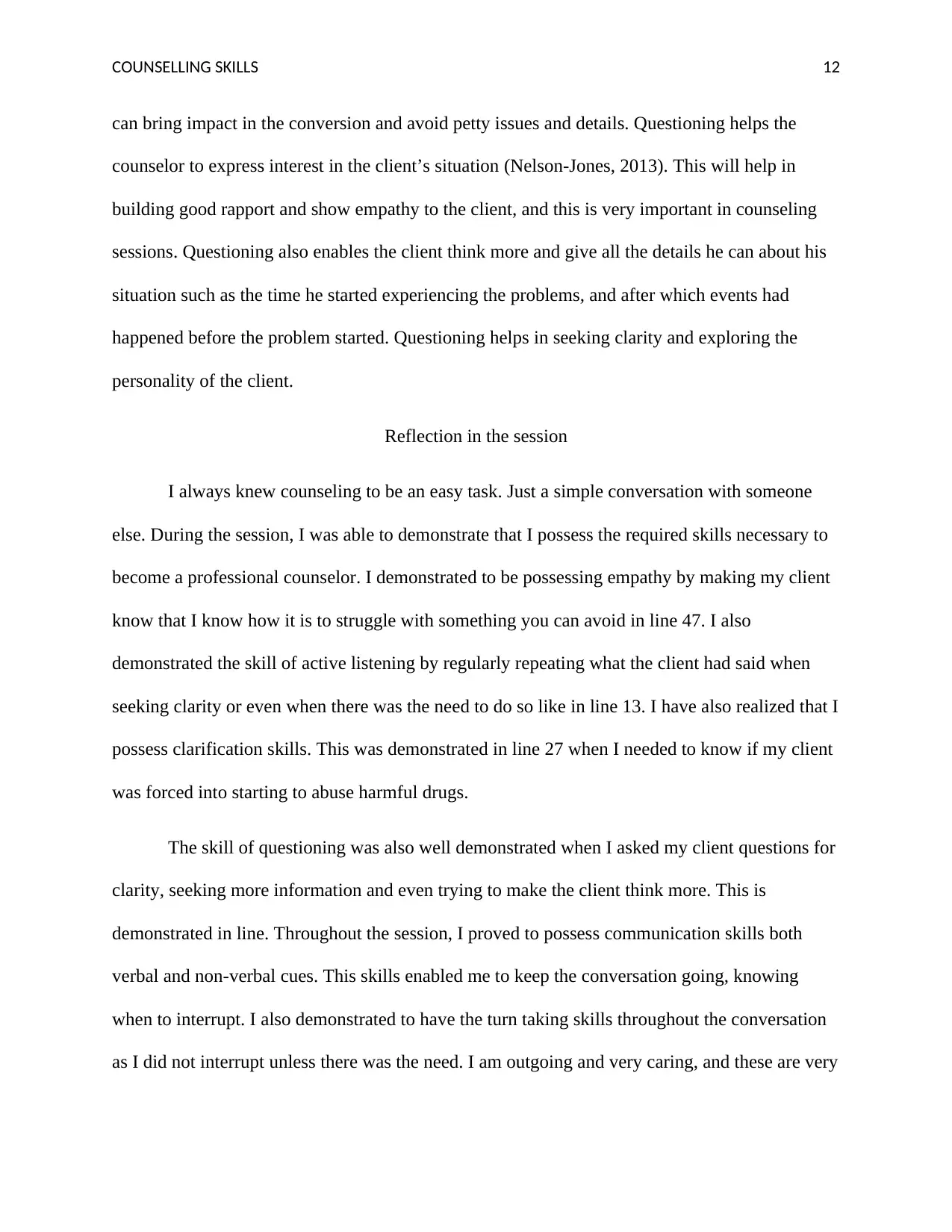
COUNSELLING SKILLS 12
can bring impact in the conversion and avoid petty issues and details. Questioning helps the
counselor to express interest in the client’s situation (Nelson-Jones, 2013). This will help in
building good rapport and show empathy to the client, and this is very important in counseling
sessions. Questioning also enables the client think more and give all the details he can about his
situation such as the time he started experiencing the problems, and after which events had
happened before the problem started. Questioning helps in seeking clarity and exploring the
personality of the client.
Reflection in the session
I always knew counseling to be an easy task. Just a simple conversation with someone
else. During the session, I was able to demonstrate that I possess the required skills necessary to
become a professional counselor. I demonstrated to be possessing empathy by making my client
know that I know how it is to struggle with something you can avoid in line 47. I also
demonstrated the skill of active listening by regularly repeating what the client had said when
seeking clarity or even when there was the need to do so like in line 13. I have also realized that I
possess clarification skills. This was demonstrated in line 27 when I needed to know if my client
was forced into starting to abuse harmful drugs.
The skill of questioning was also well demonstrated when I asked my client questions for
clarity, seeking more information and even trying to make the client think more. This is
demonstrated in line. Throughout the session, I proved to possess communication skills both
verbal and non-verbal cues. This skills enabled me to keep the conversation going, knowing
when to interrupt. I also demonstrated to have the turn taking skills throughout the conversation
as I did not interrupt unless there was the need. I am outgoing and very caring, and these are very
can bring impact in the conversion and avoid petty issues and details. Questioning helps the
counselor to express interest in the client’s situation (Nelson-Jones, 2013). This will help in
building good rapport and show empathy to the client, and this is very important in counseling
sessions. Questioning also enables the client think more and give all the details he can about his
situation such as the time he started experiencing the problems, and after which events had
happened before the problem started. Questioning helps in seeking clarity and exploring the
personality of the client.
Reflection in the session
I always knew counseling to be an easy task. Just a simple conversation with someone
else. During the session, I was able to demonstrate that I possess the required skills necessary to
become a professional counselor. I demonstrated to be possessing empathy by making my client
know that I know how it is to struggle with something you can avoid in line 47. I also
demonstrated the skill of active listening by regularly repeating what the client had said when
seeking clarity or even when there was the need to do so like in line 13. I have also realized that I
possess clarification skills. This was demonstrated in line 27 when I needed to know if my client
was forced into starting to abuse harmful drugs.
The skill of questioning was also well demonstrated when I asked my client questions for
clarity, seeking more information and even trying to make the client think more. This is
demonstrated in line. Throughout the session, I proved to possess communication skills both
verbal and non-verbal cues. This skills enabled me to keep the conversation going, knowing
when to interrupt. I also demonstrated to have the turn taking skills throughout the conversation
as I did not interrupt unless there was the need. I am outgoing and very caring, and these are very
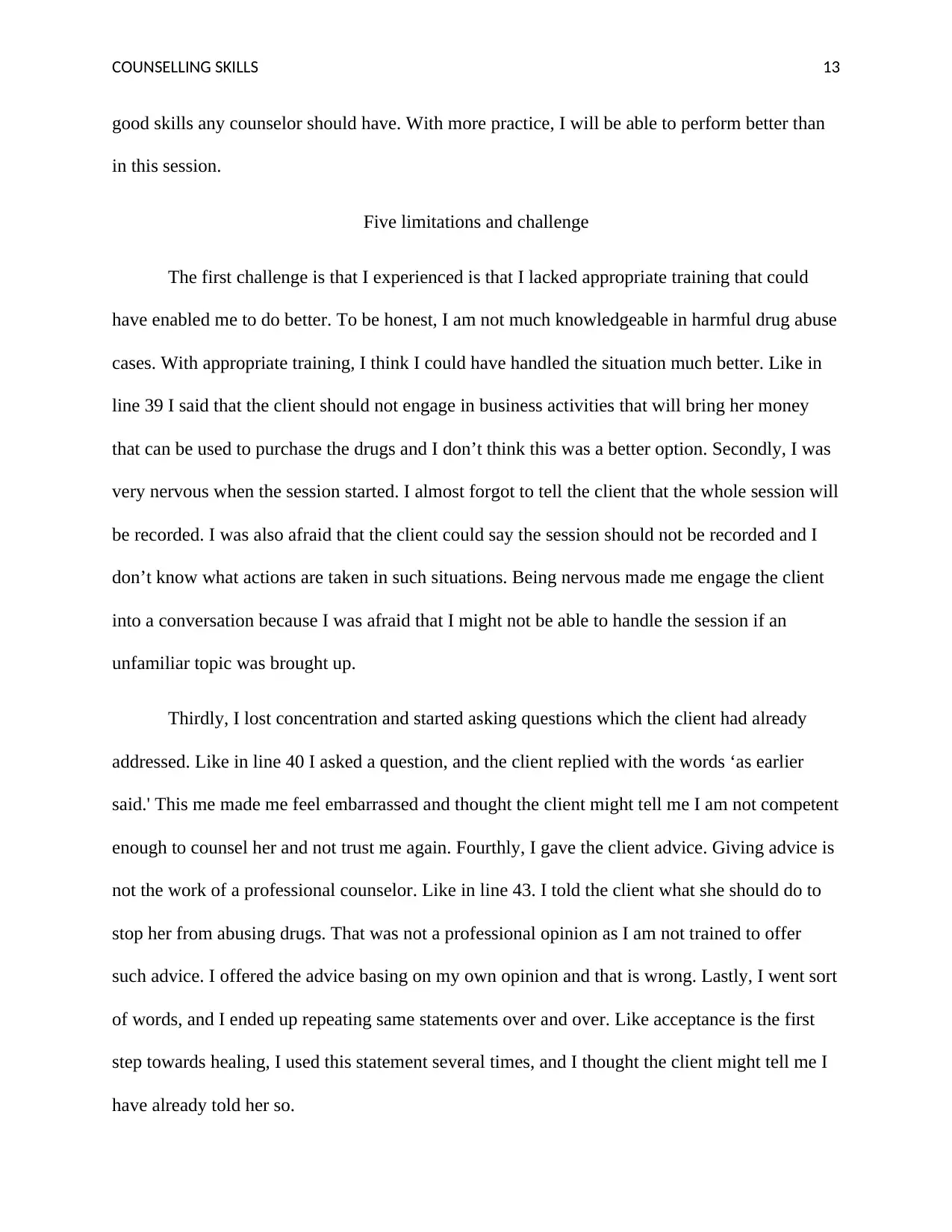
COUNSELLING SKILLS 13
good skills any counselor should have. With more practice, I will be able to perform better than
in this session.
Five limitations and challenge
The first challenge is that I experienced is that I lacked appropriate training that could
have enabled me to do better. To be honest, I am not much knowledgeable in harmful drug abuse
cases. With appropriate training, I think I could have handled the situation much better. Like in
line 39 I said that the client should not engage in business activities that will bring her money
that can be used to purchase the drugs and I don’t think this was a better option. Secondly, I was
very nervous when the session started. I almost forgot to tell the client that the whole session will
be recorded. I was also afraid that the client could say the session should not be recorded and I
don’t know what actions are taken in such situations. Being nervous made me engage the client
into a conversation because I was afraid that I might not be able to handle the session if an
unfamiliar topic was brought up.
Thirdly, I lost concentration and started asking questions which the client had already
addressed. Like in line 40 I asked a question, and the client replied with the words ‘as earlier
said.' This me made me feel embarrassed and thought the client might tell me I am not competent
enough to counsel her and not trust me again. Fourthly, I gave the client advice. Giving advice is
not the work of a professional counselor. Like in line 43. I told the client what she should do to
stop her from abusing drugs. That was not a professional opinion as I am not trained to offer
such advice. I offered the advice basing on my own opinion and that is wrong. Lastly, I went sort
of words, and I ended up repeating same statements over and over. Like acceptance is the first
step towards healing, I used this statement several times, and I thought the client might tell me I
have already told her so.
good skills any counselor should have. With more practice, I will be able to perform better than
in this session.
Five limitations and challenge
The first challenge is that I experienced is that I lacked appropriate training that could
have enabled me to do better. To be honest, I am not much knowledgeable in harmful drug abuse
cases. With appropriate training, I think I could have handled the situation much better. Like in
line 39 I said that the client should not engage in business activities that will bring her money
that can be used to purchase the drugs and I don’t think this was a better option. Secondly, I was
very nervous when the session started. I almost forgot to tell the client that the whole session will
be recorded. I was also afraid that the client could say the session should not be recorded and I
don’t know what actions are taken in such situations. Being nervous made me engage the client
into a conversation because I was afraid that I might not be able to handle the session if an
unfamiliar topic was brought up.
Thirdly, I lost concentration and started asking questions which the client had already
addressed. Like in line 40 I asked a question, and the client replied with the words ‘as earlier
said.' This me made me feel embarrassed and thought the client might tell me I am not competent
enough to counsel her and not trust me again. Fourthly, I gave the client advice. Giving advice is
not the work of a professional counselor. Like in line 43. I told the client what she should do to
stop her from abusing drugs. That was not a professional opinion as I am not trained to offer
such advice. I offered the advice basing on my own opinion and that is wrong. Lastly, I went sort
of words, and I ended up repeating same statements over and over. Like acceptance is the first
step towards healing, I used this statement several times, and I thought the client might tell me I
have already told her so.
Paraphrase This Document
Need a fresh take? Get an instant paraphrase of this document with our AI Paraphraser
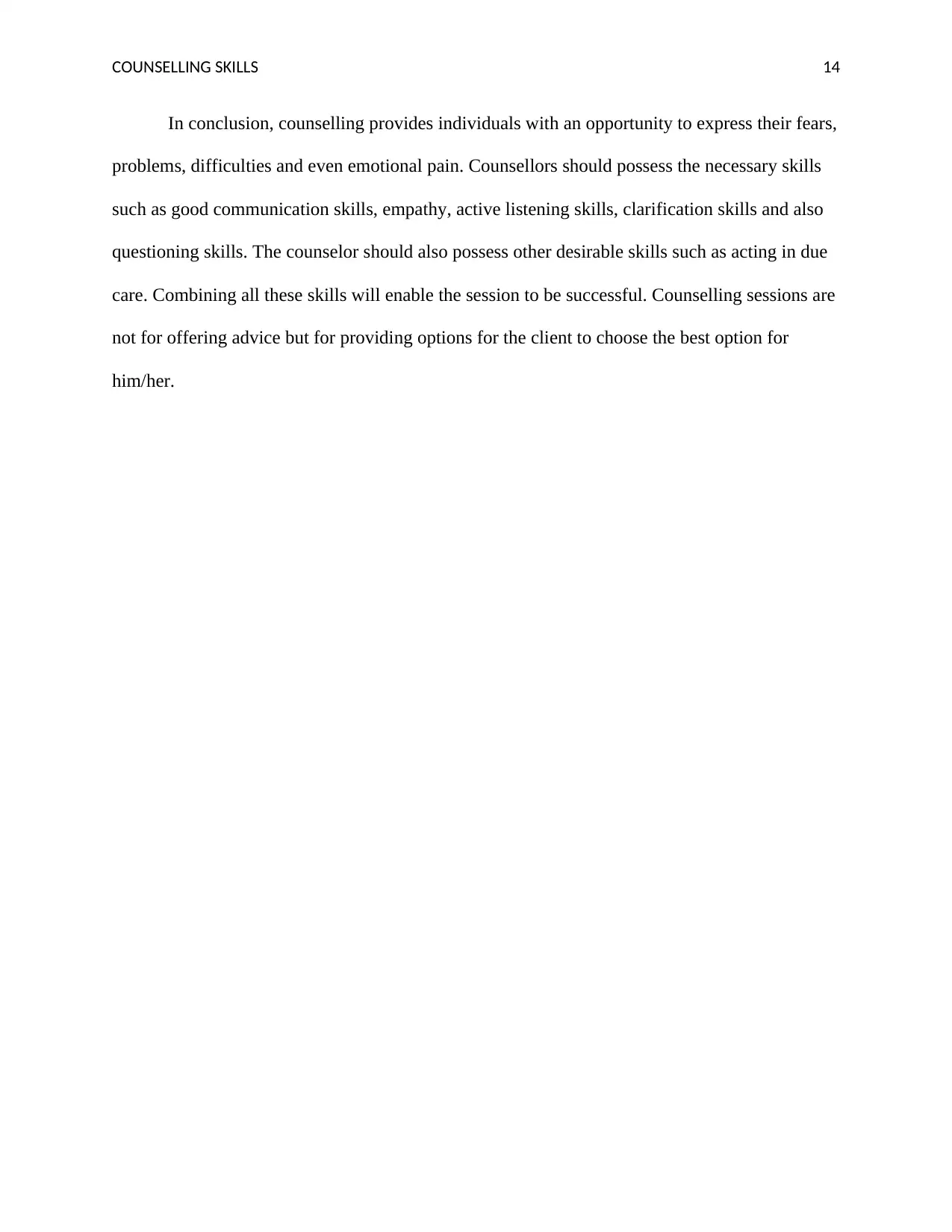
COUNSELLING SKILLS 14
In conclusion, counselling provides individuals with an opportunity to express their fears,
problems, difficulties and even emotional pain. Counsellors should possess the necessary skills
such as good communication skills, empathy, active listening skills, clarification skills and also
questioning skills. The counselor should also possess other desirable skills such as acting in due
care. Combining all these skills will enable the session to be successful. Counselling sessions are
not for offering advice but for providing options for the client to choose the best option for
him/her.
In conclusion, counselling provides individuals with an opportunity to express their fears,
problems, difficulties and even emotional pain. Counsellors should possess the necessary skills
such as good communication skills, empathy, active listening skills, clarification skills and also
questioning skills. The counselor should also possess other desirable skills such as acting in due
care. Combining all these skills will enable the session to be successful. Counselling sessions are
not for offering advice but for providing options for the client to choose the best option for
him/her.
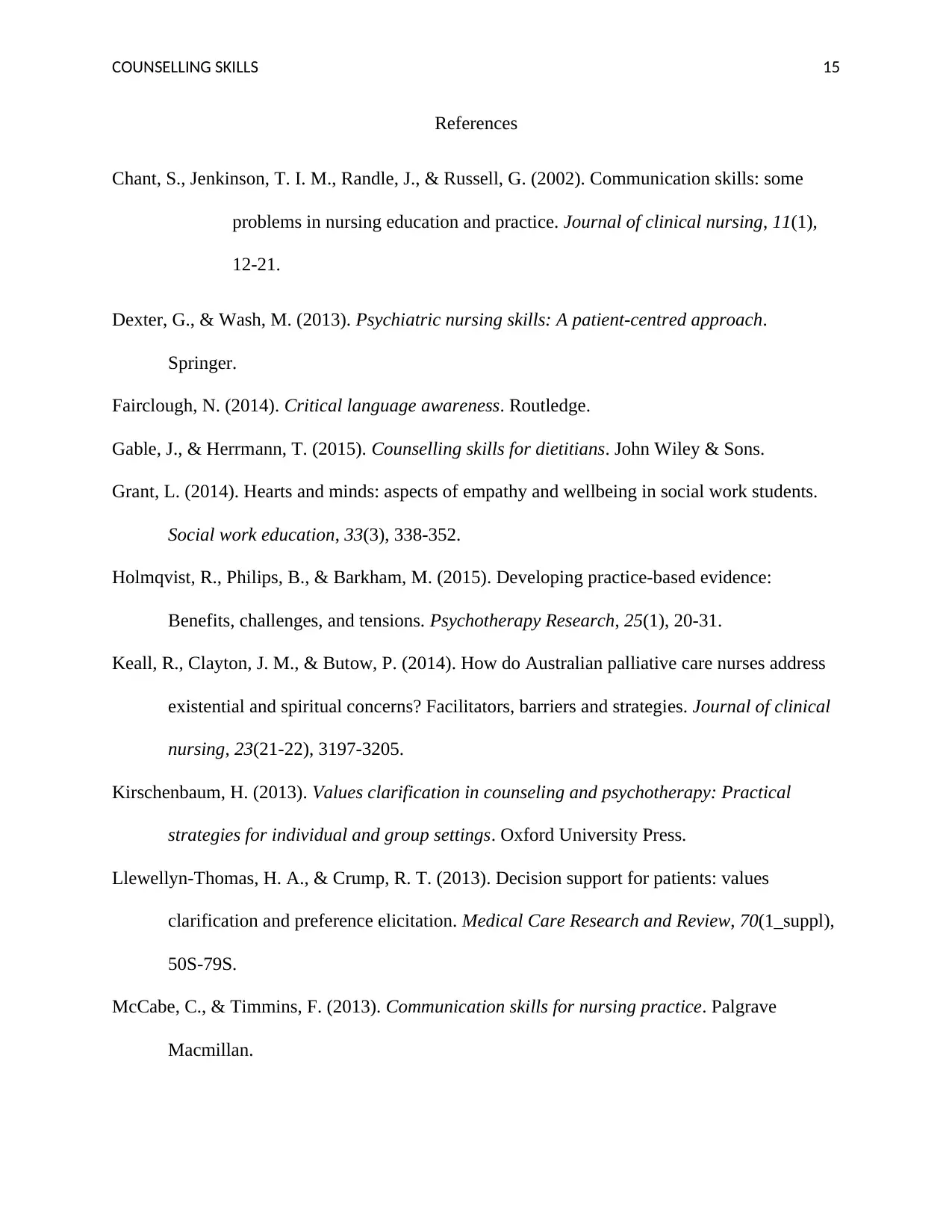
COUNSELLING SKILLS 15
References
Chant, S., Jenkinson, T. I. M., Randle, J., & Russell, G. (2002). Communication skills: some
problems in nursing education and practice. Journal of clinical nursing, 11(1),
12-21.
Dexter, G., & Wash, M. (2013). Psychiatric nursing skills: A patient-centred approach.
Springer.
Fairclough, N. (2014). Critical language awareness. Routledge.
Gable, J., & Herrmann, T. (2015). Counselling skills for dietitians. John Wiley & Sons.
Grant, L. (2014). Hearts and minds: aspects of empathy and wellbeing in social work students.
Social work education, 33(3), 338-352.
Holmqvist, R., Philips, B., & Barkham, M. (2015). Developing practice-based evidence:
Benefits, challenges, and tensions. Psychotherapy Research, 25(1), 20-31.
Keall, R., Clayton, J. M., & Butow, P. (2014). How do Australian palliative care nurses address
existential and spiritual concerns? Facilitators, barriers and strategies. Journal of clinical
nursing, 23(21-22), 3197-3205.
Kirschenbaum, H. (2013). Values clarification in counseling and psychotherapy: Practical
strategies for individual and group settings. Oxford University Press.
Llewellyn-Thomas, H. A., & Crump, R. T. (2013). Decision support for patients: values
clarification and preference elicitation. Medical Care Research and Review, 70(1_suppl),
50S-79S.
McCabe, C., & Timmins, F. (2013). Communication skills for nursing practice. Palgrave
Macmillan.
References
Chant, S., Jenkinson, T. I. M., Randle, J., & Russell, G. (2002). Communication skills: some
problems in nursing education and practice. Journal of clinical nursing, 11(1),
12-21.
Dexter, G., & Wash, M. (2013). Psychiatric nursing skills: A patient-centred approach.
Springer.
Fairclough, N. (2014). Critical language awareness. Routledge.
Gable, J., & Herrmann, T. (2015). Counselling skills for dietitians. John Wiley & Sons.
Grant, L. (2014). Hearts and minds: aspects of empathy and wellbeing in social work students.
Social work education, 33(3), 338-352.
Holmqvist, R., Philips, B., & Barkham, M. (2015). Developing practice-based evidence:
Benefits, challenges, and tensions. Psychotherapy Research, 25(1), 20-31.
Keall, R., Clayton, J. M., & Butow, P. (2014). How do Australian palliative care nurses address
existential and spiritual concerns? Facilitators, barriers and strategies. Journal of clinical
nursing, 23(21-22), 3197-3205.
Kirschenbaum, H. (2013). Values clarification in counseling and psychotherapy: Practical
strategies for individual and group settings. Oxford University Press.
Llewellyn-Thomas, H. A., & Crump, R. T. (2013). Decision support for patients: values
clarification and preference elicitation. Medical Care Research and Review, 70(1_suppl),
50S-79S.
McCabe, C., & Timmins, F. (2013). Communication skills for nursing practice. Palgrave
Macmillan.
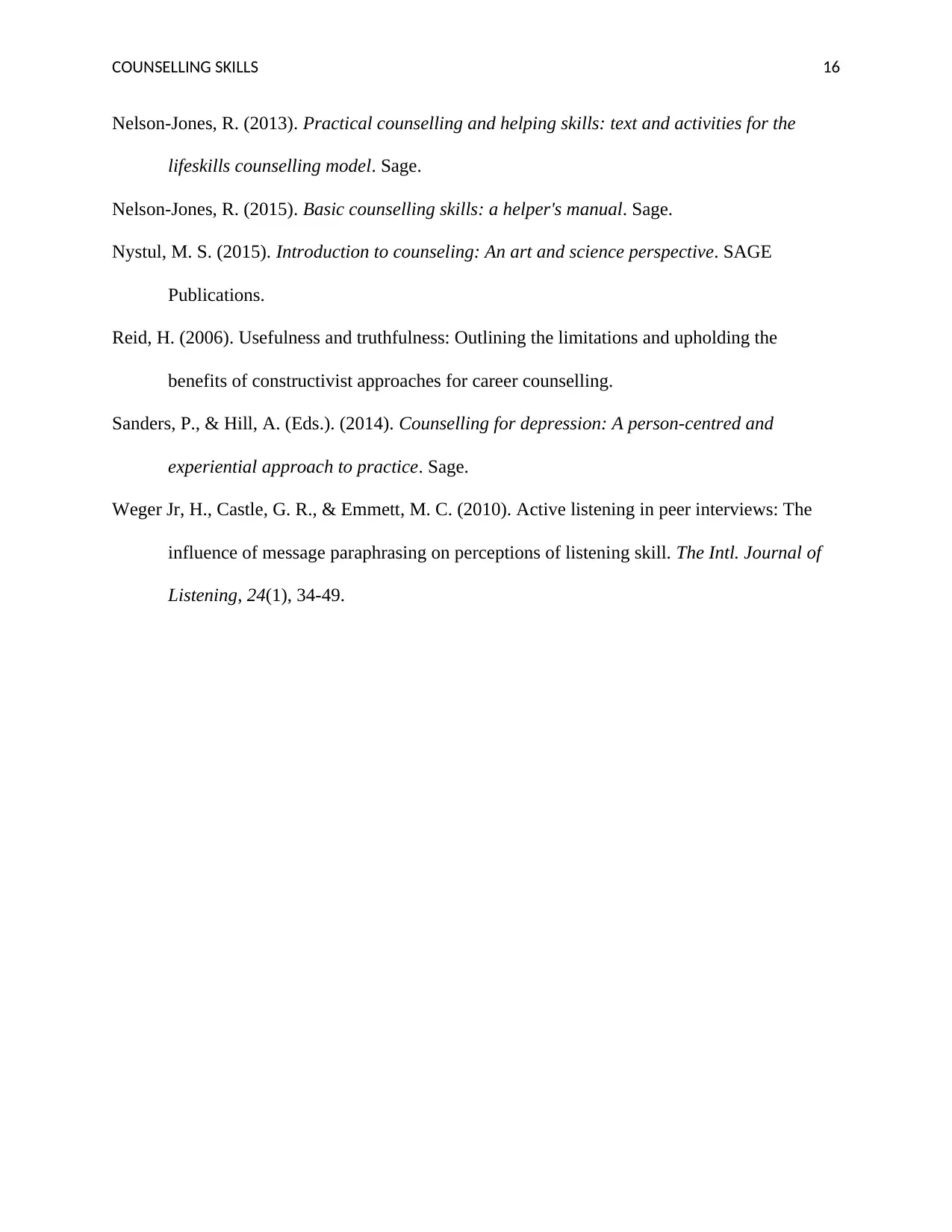
COUNSELLING SKILLS 16
Nelson-Jones, R. (2013). Practical counselling and helping skills: text and activities for the
lifeskills counselling model. Sage.
Nelson-Jones, R. (2015). Basic counselling skills: a helper's manual. Sage.
Nystul, M. S. (2015). Introduction to counseling: An art and science perspective. SAGE
Publications.
Reid, H. (2006). Usefulness and truthfulness: Outlining the limitations and upholding the
benefits of constructivist approaches for career counselling.
Sanders, P., & Hill, A. (Eds.). (2014). Counselling for depression: A person-centred and
experiential approach to practice. Sage.
Weger Jr, H., Castle, G. R., & Emmett, M. C. (2010). Active listening in peer interviews: The
influence of message paraphrasing on perceptions of listening skill. The Intl. Journal of
Listening, 24(1), 34-49.
Nelson-Jones, R. (2013). Practical counselling and helping skills: text and activities for the
lifeskills counselling model. Sage.
Nelson-Jones, R. (2015). Basic counselling skills: a helper's manual. Sage.
Nystul, M. S. (2015). Introduction to counseling: An art and science perspective. SAGE
Publications.
Reid, H. (2006). Usefulness and truthfulness: Outlining the limitations and upholding the
benefits of constructivist approaches for career counselling.
Sanders, P., & Hill, A. (Eds.). (2014). Counselling for depression: A person-centred and
experiential approach to practice. Sage.
Weger Jr, H., Castle, G. R., & Emmett, M. C. (2010). Active listening in peer interviews: The
influence of message paraphrasing on perceptions of listening skill. The Intl. Journal of
Listening, 24(1), 34-49.
1 out of 16
Related Documents
Your All-in-One AI-Powered Toolkit for Academic Success.
+13062052269
info@desklib.com
Available 24*7 on WhatsApp / Email
![[object Object]](/_next/static/media/star-bottom.7253800d.svg)
Unlock your academic potential
© 2024 | Zucol Services PVT LTD | All rights reserved.





